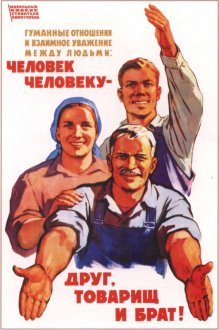You are
in the middle of Moscow or any other Russian
city and want to ask for directions. What will you call a
person in the
street, the person you don’t know?
In
English, you can say “Mister”, “Mrs”, “Miss”, “Sir” or
“Madam”. In Russian it is often very difficult for the Russians
themselves to find
the right word to call a person.
We have
the words [gaspad-EE-n] Господин (Mister)
and [gaspazhA] Госпожа (Ms/
Mrs.).
What
other choices do we have? What other words can you use when
talking to another person?
1. Impersonal
Form of Addressing People.
I think
it is the best way to draw the attention of a person you
don’t know. In this case, you need to use a verb in an
imperative mood in
the 2nd person:
e.g., Извините [-ee-zv-ee-n-EE-te]
–
Excuse me.
2. "A Young Man/ Miss"
It is
quite common in Russia to call young people:
Молодой человек [maladOy
ch-ee-lavEk]
– “A young man”
Девушка [dEv-oo-shka] – Miss
I find
it is quite tricky, though. One is supposed to be able to
judge other person’s age. Where is that boundary, a line, when one can
call
another person “young”?
Of
course, if you are confident and can say that this is a young
man or a girl then you can go ahead and call him or her Молодой человек (a
young man)
or Девушка (Miss)
– totally acceptable.
But as
to older people, calling them Молодой человек (a
young man)
or Девушка (Miss)
might offend them or, who knows, might flatter them.
3. Man and Woman.
Мужчина [m-oo-shch-EE-na] – a man
Женщина [zhEn-shch-ee-na] – a
woman
These
words are used very often by Russian people. It is a very
rude in my opinion, but unfortunately, it is quite popular.
Can you
imagine anybody saying something like this in English: “Woman, where is
the British Museum?”
However
in the Russian language it would be quite all right to
say:
4. Citizen.
Гражданин [grazhdan-EE-n]
– citizen (male)
Гражданка [grazhdAnka] –
citizen (female)
The word
has a very specific application. It appeared in
the language at the times of Stalin’s repressions. Suddenly
overnight officials: policemen (militia), post-office clerks
etc. started
calling their “customers” Гражданин (citizen)
and Гражданка (citizen).
The words are very formal and still used by police and other
legal
authorities, law-enforcement units, customs.
5. Господин (Mr.)
and Госпожа (Mrs.).
As I
have already mentioned, those words are used in formal
language and are very rare in a conversation. It is probably the result
of our
Russian-Soviet history, and how the Russian language developed and
changed.
The words Господин [gaspad-EE-n] (Mr.) and Госпожа [gaspazhA] (Mrs.) have a
touch of superiority to them.
Господин (Mr.)
originally comes from the word meaning “master, sovereign”.
6. Comrade
Товарищ  [tavAr-ee-shch-]
[tavAr-ee-shch-]
It was so much easier in the Soviet times! One could call another person Товарищ (comrade) and not to worry about being awkward, the same word could be used when talking to a man or a woman, younger, older one – it didn’t matter.
When
so-called Перестройка [p-ee-r-ee-strOyka] (reorganisation,
rebuilding)
happened in the mid-late 1980s the word Товарищ (comrade)
suddenly became negative and was associated with the Communist ideology
and
propaganda.
Originally
the word Товарищ (comrade)
was used only in relation to the members of the revolutionary communist
party.
It’s all
very confusing but I guess little can be done, that’s
how the history and language have changed and evolved.
And
thanks to all these historical changes Russian people stopped
being Comrades Товарищи (comrades)
but have not become Дамы (ladies)
and Господа (gentlemen)
It
is easy
to rename towns and streets, give them their old, pre-revolutionary
names, but
it is quite difficult to change people’s mentality.





